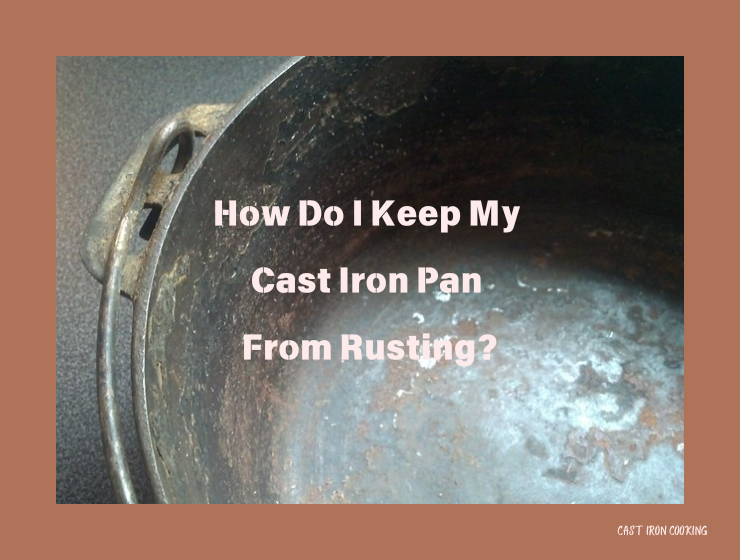Do you want to know how to keep your cast iron pan from rusting?
Maybe you just restored a rusty skillet and want to prevent it from rusting again, or your pan doesn’t have rust, and you simply want to keep it from forming. That’s understandable.
No one wants a rusty skillet, so knowing how to prevent it from rusting is a good idea.
Table of Contents
How Do I Keep My Cast Iron Pan From Rusting?
To prevent your cast iron pan from rusting, know these three things: First, dry it thoroughly and never soak it in water. Second, keep it seasoned, as the seasoning protects the pan from rusting. Third, don’t leave it over the fire too long, as this could burn off the finish (aka the seasoning).
1) Dry It Thoroughly
Rust is the common name for iron oxide, which is usually reddish-brown in color. Iron oxide is an iron, hydrogen, and oxygen chemical compound that occurs when iron is exposed to air and moisture.
You can still get your cast iron pan wet because rust doesn’t occur instantaneously. But it does mean you have to dry your pan instead of letting it air dry.
This also means you shouldn’t put your pan in the dishwasher, as that would be like soaking and exposing the pan to water for too long.
Interestingly, a pan left out in the elements (air and moisture) for long enough will eventually rust entirely. At some point, the pan would no longer be salvageable.
On the other hand, a little surface rust that you can wash off is not an issue at all. Just wash the rust off, dry, and season the pan.
A dry, seasoned pan cannot rust.
2) Keep It Seasoned
Equally important is keeping your pan seasoned, as seasoning provides the protection the pan needs to prevent rust.
Water or moisture plus air causes rust to form, but a lack of seasoning makes rusting more likely.
Cast iron seasoning is simply a layer of oil baked onto the pan through polymerization.
Seasoning has two primary benefits: it prevents the pan from rusting and creates a black patina and nonstick surface.
RELATED > > > > > What Happens If I Don’t Season My Cast Iron Pan?
How To Keep Cast Iron Pans From Rusting
3) Don’t Burn off the Finish
We have already discussed the necessity of seasoning, also called the finish.
Nowadays, most cast iron pans come pre-seasoned, but the best way to keep the seasoning or build on it to make it stronger and more nonstick depends on how you want to do it.
Some people are after that shiny black patina, while others simply want their pan to be functional and have no rust.
It’s true that a built-up seasoning will better protect your pan from rust, and provide a more nonstick surface.
Consequently, a less-seasoned pan is more at risk of losing its seasoning and, therefore, rusting.
Given enough time, fire will burn off the seasoning. I know because I did it twice.
Both times, I dried my skillet on the burner because I had heard it was the best way to dry my pan thoroughly.
Unfortunately, I forgot about it and left the pan on the burner until I could smell it smoking. The fire burned off the finish on the bottom, and I had to reseason the pan in the oven.
RELATED > > > > > Keep Your Cast Iron Pan Seasoned – 4 Different Methods
How Do You Keep a Cast Iron Skillet From Rusting?
My Experience
Although I have no experience with cast iron pans rusting, I do have some experience with my pan losing its seasoning.
Fortunately, I understood the importance of keeping my pan seasoned and handled the problem before rust formed.
For everyday use, the number one thing I do is keep my pan dry. I don’t add oil after every use, but after every three or four uses—sometimes, not even that often. Nor do I season my pan in the oven unless there is good reason.
I completely agree that the pan needs to be seasoned, but I think it’s unnecessary to season it after every use because it should already be seasoned. In other words, the pan doesn’t lose its seasoning just because I cooked in it.
And as long as the pan is seasoned and dry, rusting is not a problem.
At the risk of forgetting, I have tried adding a bit of oil to the cooking surface and drying it upside down over a burner for a couple of minutes (as seen in the first video).
Thankfully, I haven’t left my pan on the burner too long and burned off the finish. I find this method helpful in building up my seasoning and making the pan nonstick.
However, if I forget and the seasoning burns off, I won’t do this way any longer.
Even though I figure no one wants a rusty cast iron skillet, can you cook in it if you have one? The answer might surprise you.
When I saw a rusty skillet on my daughter’s and son-in-law’s stovetop, I wondered if they cooked in the pan. They had just bought the house, and my son-in-law said it came with it, and he hadn’t used it.
But could he?
RELATED > > > > > Can I Cook in a Rusty Cast Iron Pan? – 3 Things to Consider
Final Thoughts
If you were asking how to prevent your cast iron pan from rusting, you read about three things you need to know:
- Dry your cast iron pan thoroughly
- Keep your cast iron pan seasoned
- Don’t burn off the finish of your cast iron pan
If you remember these three things, you should not have to worry about your pan rusting.
